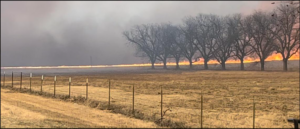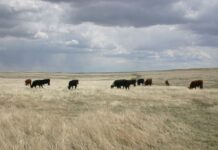As reported in High Plains Journal, once again, wildfires have blazed their way across the Plains, scorching everything in their path. High winds, dry conditions and low humidity on March 17 were the recipe for multiple fire breakouts across Texas and Oklahoma—and many fires burned for days or still are not controlled. As of March 22, 76 fires had broken out in central and western Texas in the past week, and over 104,855 acres turned to ash.
The town of Carbon, Texas—population 250—in Eastland County, was surrounded by multiple fires that merged into the Eastland Complex Fire. This complex was only 60% contained as of March 22 and ended up scorching 80% of the town, including 85 homes, according to Chris Brown, a local resident and volunteer firefighter. Brown was at the head of the fire when it first broke out on March 17 and helped fight it for days.
“If you were driving 50 miles per hour, that fire was going 60,” Brown explained. “We couldn’t stop it. I’d say it has gotten to 15 miles wide and 20 to 25 miles long.”
As of March 22, the Eastland fire had burned more than 54,000 acres and tragically, Eastland County Sheriff’s Deputy Sgt. Barbara Fenley was killed trying to check on an elderly citizen during the evacuations in the Carbon area.
“The fire service warned us the day before the fires broke out that March 17 would be the worst fire conditions since 2009 with the temperature, wind and humidity,” Brown explained. “They told us there was a 60% chance something would happen, and it did. The resources were so scattered because there were so many fires burning that no one could stop them. Our boys here in Carbon did an unbelievable job, because it hit our town in about 45 minutes, and there was not a life lost in our town. The Carbon Fire Department team are heroes.”
There has not been an account of the livestock loss, but Brown estimates from ranchers he has spoken to that losses from the Eastland Complex Fire are somewhere around 600 head, with more expected to be added to that number in the coming days. He said one reason the death toll is not as high is that many cattle were able to flee the flames because firefighters and ranchers were opening every gate they could during the evacuation of the area, giving the livestock an escape route. Brown offered up his pens and roping arena for any displaced animals until their owners could be contacted and moved to other locations.
He was fortunate to not have any structures destroyed in the flames, and some of his land, which was between the two fires that merged was somehow spared from the blaze. A tease of a rain shower on March 21 may have provided some relief for fire conditions, but raging winds the rest of the week will increase the chance for more breakouts. Forest service representatives are monitoring conditions in Eastland County and everyone is praying for moisture and for the wind to go down.
Donation efforts
Wildfire stories often feel like déjà vu these days; another wildfire destroys everything in its wake and it takes years to rebuild. Fortunately, the agriculture community always has a massive response in donations and resources to help wildfire victims. So many fires have devastated the High Plains the last few years, and farmers and ranchers seem to become one big family when a fire breaks out. Quinton Whitfield, a hay dealer in the Lubbock area—who also raised fund and helped feed cattle when the Panhandle Fire of 2017 hit—has been coordinating loads of hay, supplies and collecting donations for the Texas fires over the last few days and says the response has be astounding.
“I called some hay growers in the Lubbock area area and they came up with some loads of hay to donate,” Whitfield said. “At first, I thought we were going to have to take some of the funds we were raising and buy some hay, because I can’t ask all these guys to give away what they’ve put all this money into. But as time went on, I was getting calls every 30 minutes on loads of hay people were wanting to donate and we haven’t needed to put any money to hay so far.”
With the price of diesel these days, transportation was a concern, but the truckers stepped up and volunteered their time, trucks and fuel, even if they did not have experience hauling hay.
“I get calls where guys will say they don’t know anything about hay, but they want to haul it,” Whitfield explained. “Even though we’ve offered money for fuel, every one of them has turned me away on that. They say no, put that to another use, like buying supplies or feed.”
The impact of the donations has certainly been felt by the Eastland County area.
“It has been unbelievable with the resources and the giving,” Brown said. “It’s a Godsend. Donations have come in from everywhere and the electric company had our electricity back on in three days. Cowboys have come from everywhere to help us feed and move cattle.”
Whitfield said he has collected quite a bit of money, mostly off Facebook.
“I think right now I’ve got close to $15,000 just off social media donations,” he said. “There have been a lot of people who give $20 or $50, and when you get a lot of people doing that, you can get a lot of money really quick.”
In an incredible pay-it-forward move, Whitfield said many of the people reaching out to help the Eastland Complex victims are actually people who were in the path of the Panhandle Fires.
“I have talked to a bunch of people who said ‘I live in the Pampa area and here is a cash donation because these people helped us back then.’”
Whitfield said finding cattle cubes was a big issue prior to the fires due to supply chain issues, and he was told he might not be able to secure a load for the fire victims for another week. While waiting for a price and an arrival estimate, a dealer in Canadian, Texas, called and said he wanted to get them a load of feed because, ‘Ya’ll did it for us before and we are going to do it for y’all now.” By then end of the day, the dealer had found two loads of cubes for the Eastland Complex fire victims.
“Anybody in this industry will drop what they’re doing and do anything to help in any way they can,” Whitfield explained of the insurmountable generosity. “It’s just what you do. Yesterday, (March 20) when there were new fires breaking out in different locations, within hours there were 1,000 or more pickups and trailers with people offering to evacuate horses and cattle for people they didn’t even know. And there were a lot of people who were sending donations from out of state. When something like this happens, everyone is your neighbor, no matter where they’re at.”
Whitfield said there are many people donating, but ranchers also need hands-on help, so his next move is to head out to the area and start helping cattle producers feed, move cattle, take sick animals to the vet and anything else he can do. He said everything and anything is needed for the people affected by the fires. According to Brown, even though the Eastland Complex Fires were declared a National Disaster, the Federal Emergency Management Agency had pulled out of the area on March 21, saying that the town of Carbon was too small for them to provide financial assistance, so the agriculture community’s response is even more meaningful to people of the southern Plains.
To learn more about donating, contact Quinton Whitfield at 254-977-2688, inquire about the wildfire relief fund at any Happy State Bank or visit www.cottonfestlubbock.com to donate to the High Cotton Relief Fund and put wildfire relief in the memo.



